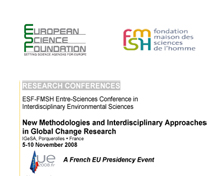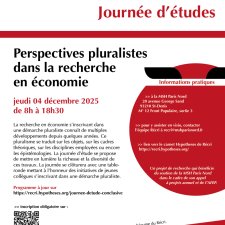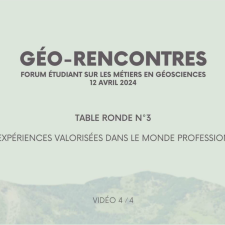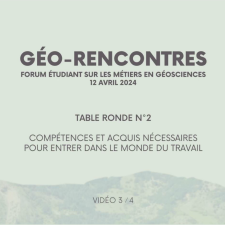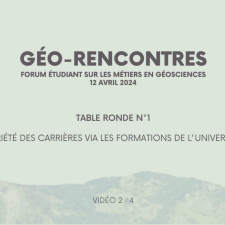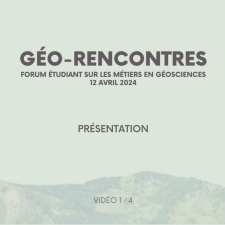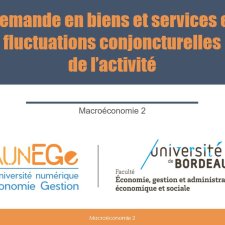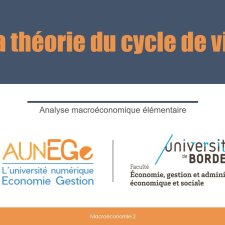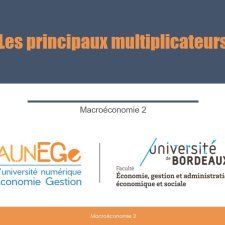Chapitres
- Volkmar LAUBER13'42"
- Joël GUIOT07'22"
Notice
Conference Opening
- document 1 document 2 document 3
- niveau 1 niveau 2 niveau 3
Descriptif
The European Science Foundation (ESF) and the French Foundation of the Maison des Sciences de l’Homme (FMSH) (within the Entre-Sciences programme) have agreed to jointly develop a new conference series in environmental sciences; an effort to actively foster exchanges between scientists working in the humanities and social sciences and their colleagues in the life and natural sciences.
This interdisciplinary conference present the new advances in the modelling of the Global Change that combines Geosciences and Economics, with a perspective view from history - given the novelty of their interrelations – and from political science – given the impact of the model outputs in the public sphere. The conference gather together speakers and attendees from Europe, United States and Asia.
The conference focuses on new advances in the construction of models of the global change, in Earth sciences and in Economics. Given the issues at stake with Global Warning in terms of impacts and risks, these multidisciplinary approaches are necessarily placed in a public policy perspective, a case apparently unique in the history of science. Chaired by Joël Guiot, climatologist at the European Centre for the Research and Teaching of the Geosciences of the Environment (CEREGE, Aix-en-Provence) and Sylvie Thoron, economist at the Aix-Marseille Research Group in Quantitative Economy (GREQAM, Marseille), the conference aims at generating intense discussions between scientists coming from various disciplinary horizons, by emphasizing the need for integrative approaches when thinking of our future in terms of sustainable development.
>> More information on the web site site web Entre-Sciences Programme.
Intervention / Responsable scientifique
Dans la même collection
-
Comparison of Simulated Tree-Ring Cellulose d180 at the European Scale
DanisPierre-AlainIn order to investigate factors involved in the inter-annual variability of d180 in tree ring cellulose (d18OTRC), we simulated the d18OTRC from 1960 to 2001 over Europe. We used 1) simulated climate
-
Borehole Climatology and Model Simulations: Steps to Integrated Assessment
Gonzales RoucoJesus FelipeProgress in understanding climate variability through the last millennium leans on simulation and reconstruction efforts. Exercises blending both approaches present a great potential for answering
-
Food demand, Productivity Growth and the Spatial Distribution of Land and Water use: A Global Model…
PoppAlexanderNowadays, human society appropriates about one quarter of total net primary production of the terrestrial biosphere. Production of food, energy and materials, and the related use of land and water
-
Turning Hazards into Ressources? Climate Change, Floods and Coastal Wetlands in the Costa Brava (No…
Serra-LlobetAnnaAccording to the IPCC Fourth Assessment, one of the most vulnerable areas in Europe are coastal zones. This is due to sea level rise combined with increased risks from storms. Coastal wetlands, in
-
Debate
HourcadeJean-CharlesSomervilleRichardSvedinUnoDuvalRomainThe European Science Foundation (ESF) and the French Foundation of the Maison des Sciences de l’Homme (FMSH) (within the Entre-Sciences programme) have agreed to jointly develop a new conference
-
Climatic Hazard Mitigation Through Risk and Resilience Committees in Nepal
Raj AryalKomalNepal lies in an ecologically fragile and seismic region with a history of devastating Glacier Lake Outburst Flood (GLOF), landslides and earthquakes. Increases in temperature could increase the
-
Climate Models: learning from the Past Long-Term Climate Variability
JoussaumeSylvieProjections of future climate change rely on global climate models. Such models simulate the dynamics and physics of the coupled atmosphere-ocean system and move towards models of the full Earth
-
Data-Model Fusion Approach in Global Change Research: Recent Development and Future Challenges
PengChanghuiIt is increasingly recognized that global change research requires methods and strategies for combing process models and data in systematic ways. This is leading to research towards the application of
-
The Largest Lakes and reservoirs of Russia as a Priority Water Ressource for Society
LemeshkoNataliaGlobal change for the last 25 years drives to important changes in hydrometeorological regime in different regions, reflecting water resources change of the larges reservoirs and lakes of Russia and
-
Present-Day Geomorphological Changes in Polar Regions
ZwolińskiZbigniewThe landscape uniqueness of polar zone manifests itself in morphological traces of older glaciations and marine transgressions, areas of present-day glaciations, multi-year permafrost, multi-year snow
-
The Sustainability of Kyoto's Architecture: Where Did the Victims of Climate Change Go?
DupuisJohanncept of “expropriation” in the case of territories exposed to a rise in sea levels. The premise of my project is that although future generations in all countries will be affected by climate change,
-
IPCC Working Group II
ChanzyAndréThe European Science Foundation (ESF) and the French Foundation of the Maison des Sciences de l’Homme (FMSH) (within the Entre-Sciences programme) have agreed to jointly develop a new conference
Avec les mêmes intervenants et intervenantes
-
Debate
BergerA.GuiotJoëlMannMichael E.DanisPierre-AlainAmatoVincenzoThe European Science Foundation (ESF) and the French Foundation of the Maison des Sciences de l’Homme (FMSH) (within the Entre-Sciences programme) have agreed to jointly develop a new conference
-
Long Term Climate Variability: from Past to Future and from Data to Models
GuiotJoëlData show that climate has always changed in the past, sometimes with a larger amplitude than what we experimented for two decades. But the main signatures of the anthopogenic forcing are the speed of
Sur le même thème
-
Journée d’étude | Récri : Perspectives pluralistes dans la recherche en économie - PARTIE 1
MofakhamiMaloMéryFlorianAu cours de ces bientôt deux ans de séminaire, les séances mensuelles du Récri ont été l’occasion de mettre en évidence la diversité et la richesse des recherches en économie menées par des jeunes
-
Journée d’étude | Récri : Perspectives pluralistes dans la recherche en économie - PARTIE 2
TailleurGabrielMalherbeLéoCastelanelliBenjaminRosano-GrangeMarlèneRosElodieGononMorganeTosoliniMarionBétouleAliceGrangerayJonasBouffangeAlbertAu cours de ces bientôt deux ans de séminaire, les séances mensuelles du Récri ont été l’occasion de mettre en évidence la diversité et la richesse des recherches en économie menées par des jeunes
-
Géo-Rencontres 2024 / Les expériences valorisées dans le monde professionnel
LilloEmmaAraujoJulieHuartFlorianDubreuRomainBuquetDamienChazalLauraBorieMarianeForum sur les métiers en géosciences organisé par les étudiants du CMI Ingénierie Géologique et Civile, Université de Bordeaux, 12 avril 2024
-
Géo-Rencontres 2024 / Compétences et acquis nécessaires pour entrer dans le monde du travail
BrinonJulietteAmoleFili-FenuaPretouFrédéricCampetHugoLiébauxAlbinDe AlemeidaMarie-LouPoirierAymericDufrenoyAudreyForum sur les métiers en géosciences organisé par les étudiants du CMI Ingénierie Géologique et Civile, Université de Bordeaux, 12 avril 2024
-
Géo-Rencontres 2024 / Variété des carrières via les formations de l'université
InguimbertDianeLacazeRomaneLemaitreLaurieChazalLauraMontjeanPascalPoudevigneJacquesPortefaixFrédéricForum sur les métiers en géosciences organisé par les étudiants du CMI Ingénierie Géologique et Civile, Université de Bordeaux, 12 avril 2024
-
Géo-Rencontres 2024 / Présentation
LatasteJean-FrançoisLavieThéoForum sur les métiers en géosciences organisé par les étudiants du CMI Ingénierie Géologique et Civile, Université de Bordeaux, 12 avril 2024
-
Tokyo, plus grande « ville » au monde : aménager et gouverner la démesure
Languillon-AusselRaphaëlAvec ses quelques trente-cinq millions d’habitants, Tokyo est la « ville » la plus peuplée au monde, et l’une des métropoles les plus riches. Cette présentation vise à décrire, analyser et expliquer,
-
Demande en biens et services et fluctuations conjoncturelles
Maveyraud-TricoireSamuelDemande en biens et services et fluctuations conjoncturelles
-
-
-
Les propensions à consommer et à épargner
Maveyraud-TricoireSamuelLes propensions à consommer et à épargner
-
Le marché des biens et services à court terme
Maveyraud-TricoireSamuelLe marché des biens et services à court terme


